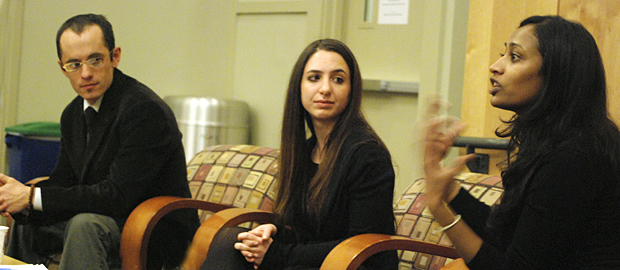Varied experiences lead to international law careers
Alumni say social justice mission of Brandeis was pivotal in their development

From left, James Bair '03, Nicole Karlebach '04, and Brahmy Poologasingham '00
Since graduating from Brandeis, Brahmy Poologasingham, James Bair and Nicole Karlebach have followed very different paths and done widely varied work en route to becoming international human rights lawyers. But all say Brandeis was pivotal in their career trajectory.
The paths from here to "there" were not always clear or linear, particularly in the case of Bair '03, who majored in English and history and minored in education. His political awakening came while still at Brandeis, as he watched the results of the 2000 Bush versus Gore election, and was reaffirmed a year later in the aftermath of Sept. 11, after which he dug into his history major to better understand the world.
After graduating, Bair's path to law school took a detour to the classroom, as he taught history at middle and high school levels. During this period, he spent a year in Ukraine, during which a revolution took place in Kiev in response to rigged elections. Bair knew something about political control of the media from an academic perspective, but seeing first-hand how the Ukrainian government suppressed news of the uprising gave him a push toward human rights law.
What he calls "the last push" was a speech by Howard Zinn, the late author of "A People's History of the United States," who spoke, at Bair's request, at a high school where Bair was teaching.
Once at Northeastern University School of Law, Bair participated in domestic and international externships including a stint with the then-understaffed Victim's Unit of the Extraordinary Chambers in the Courts of Cambodia, which was established to try serious crimes committed during the Khmer Rouge regime of 1975-1979. Bair came to see that "the practice of law can actually be an act of service."
Poologasingham '00 and Karlebach '04, who spoke along with Bair at a symposium on international law and human rights earlier this semester, both entered Brandeis with an interest in human rights and international justice. But the kinds of accidents that determined Bair's career trajectory -- the timing of his trip to Ukraine and the Victim's Unit being understaffed and thus offering him a job -- are also evident in the development of their careers.
Karlebach began building the skill set required by the field of international justice and human rights while at Brandeis, in what she believes were two particularly pivotal experiences in her academic and career development. The first was a course titled "Possibility for Change in American Communities." This two-term course gave her an opportunity to study social movements and social action in the field during the summer before her sophomore year.
Karlebach gives equal credit for her skill set to her extracurricular experiences at Brandeis, particularly her experiences in the student government as the co-chair of the Social Justice Committee. During her tenure in that position, Karlebach worked on a major campaign that culminated in a student referendum on a proposed boycott of Kraft products because of Kraft's corporate ties to cigarette maker Phillip Morris. Though the referendum did not succeed, there was a high level of student participation in the voting, awareness was raised on campus and Phillip Morris was aware of the initiative.
Karlebach later worked on a campaign to grant fair wages to the janitorial staff at Brandeis. Her community organizing skills were instrumental in her getting her first job out after Brandeis, with the People for the American Way Foundation. Karlebach now works on corporate social responsibility issues with the firm Schulte, Roth & Zabel, LLP in New York City, endeavoring to engage companies in practices that respect human rights through accountability mechanisms.
It was this strong tradition of social justice that also attracted Poologasingham to Brandeis. While here, she, like Karlebach, took advantage of opportunities to get contextual field experience in international justice and human rights work.
In 1998, as a member of the first cohort of Ethics Center Student Fellows -- now Sorensen Fellows -- Poologasingham divided her time between a program at the University of Pretoria, where she helped tackle housing development and poverty in South Africa, and the National Interest Public Law and Research program, also in Pretoria, where she was involved in research on rape prevention and education. [Read her 2000 essay about her internship experiences.]
Currently, as special advisor to the American Bar Association's Rule of Law Initiative, Poologasingham works to bring the rule of law to communities in transition.
While Poologasingham, Bair and Karlebach followed very different paths in career development, there are similarities too. Each took advantage of a ripe political climate to enhance and apply knowledge of human rights law.
In international human rights work, Bair said, "the rules are a lot fuzzier, the career path is a lot less straightforward. If you're going to go out there and do this, you're the lawyer, and you are given incredible responsibilities and incredible opportunities at the same time."
Each alumnus took time after Brandeis before committing themselves to law school; each did serious research to find a law school that had the clinical programs, professors and human rights programs they wanted. The alums credited much of their enthusiasm to Brandeis' rich history of social justice, a history Karlebach urged participants in the symposium to "relate to... and take it forward."
Note: All comments are excerpted from a panel discussion featuring Bair, Karlebach and Poologasingham, that was hosted by the Programs in International Justice and Society of the International Center for Ethics, Justice and Public Life.
Categories: Humanities and Social Sciences, International Affairs






